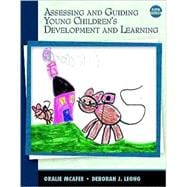
Note: Supplemental materials are not guaranteed with Rental or Used book purchases.
Purchase Benefits
What is included with this book?
Oralie McAfee is professor emerita of early childhood education at Metropolitan State College of Denver. She is the author of books, research papers, articles, curriculum and teacher-training materials, and other publications related to working with young children and their families in the classroom and home, and has presented on these topics throughout the United States. She has done research on assessment practices and needs in Head Start and in selected state-funded prekindergarten programs. She is author (with Deborah J. Leong and Elena Bodrova) of Basics of Assessment: A Primer for Early Childhood Educators (National Association for the Education of Young Children, 2004).
Deborah J. Leong is a professor emerita of psychology at Metropolitan State College of Denver and director of the Tools of the Mind Curriculum Project, a Vygotskian-based early childhood teacher-training program. She is also a research fellow at the National Institute for Early Education Research (NIEER) working on a computerized Pre-K state standards database and a database of preschool assessment instruments with Elena Bodrova. She is co-author with Dr. McAfee and Dr. Bodrova of Basics of Assessment (National Association for the Education of Young Children, 2004). Dr. Leong is also co-author with Dr. Bodrova of Tools of the Mind: The Vygotskian Approach to Early Childhood Education (Merrill/Prentice Hall, 2007) and four educational videos (Davidson Films). She has written many articles on assessment, play, early literacy, and the development of self-regulation in young children.
Part I Professionalism in Assessment
Chapter 1 Assessment in Early Childhood: A Work in Progress
Assessment Vocabulary
Expectations of Teachers
Factors Contributing to Current Practices in Assessment
Professional Responsibility
Summary
For Personal Reflection
For Further Study and Discussion
Suggested Readings
Chapter 2 Legal, Ethical, and Professional Responsibilities in Assessment
Know Federal, State, and Local Requirements Related to Assessment
Ensure that Assessment Information is Accurate and Trustworthy
Assess All Children Fairly
Follow Professional and Ethical Guidelines
Use Assessment Results in Appropriate Ways
Summary
For Personal Reflection
For Further Study and Discussion
Suggested Readings
Part II Assessing and Teaching
Chapter 3 Why, What, and When to Assess
Assessment Decisions
Why Assess?
What to Assess?
When to Assess?
Some Final Thoughts
Summary
For Personal Reflection
For Further Study and Discussion
Suggested Readings
Chapter 4 Documenting: Collecting Information
Multiple Windows
Sources of Information
Methods of Collecting Information
Contexts for Assessment
Choosing the Appropriate Assessment Window
Summary
For Personal Reflection
For Further Study and Discussion
Suggested Readings
Chapter 5 Documenting: Recording Information
Description and Examples of Recording Procedures
Selecting a Recording Procedure
Summary
For Personal Reflection
For Further Study and Discussion
Suggested Readings
Chapter 6 Compiling and Summarizing Information
Portfolios
Group and Individual Profiles and Summaries
Summary
For Personal Reflection
For Further Study and Discussion
Suggested Readings
Chapter 7 Interpreting Assessment Information
Ensure the Authenticity and Trustworthiness of the Data
Interpret and Understand the Meaning of Assessment Findings
Summary
For Personal Reflection
For Further Study and Discussion
Suggested Readings
Chapter 8 Using Assessment Information
Planning Strategies
Individual and Group Strategies
Curriculum and Classroom Modification Strategies
Examples of Using Assessment Information to Guide Instruction
Summary
For Personal Reflection
For Further Study and Discussion
Suggested Readings
Chapter 9 Organizing for Assessment
Integrating Assessment and Teaching
Developing a Plan
Organizing Files and Forms
Summary
For Personal Reflection
For Further Study and Discussion
Suggested Readings
Part III The Classroom and Beyond
Chapter 10 Standardized Tests: What Early Childhood Teachers Should Know
The Difference between an Assessment That Has Standardized Procedures and a Standardized Test
Definition of a Standardized Test
Limitations and Inadequacies of Standardized Testing
Types of Standardized Tests
The Early Childhood Teacher’s Role in Standardized Testing
Standardized Instruments Used to Measure Opportunities to Learn
Finding Out More about Standardized Tests
Summary
For Personal Reflection For Further Study and Discussion
Suggested Readings
Chapter 11 Communicating and Collaborating Using Assessment Processes and Results
Communicating with Children
Communicating with Parents
Communicating and Collaborating with Other Professionals
Professional and Personal Development and Learning
Summary
For Personal Reflection
For Further Study and Discussion
Suggested Readings
Appendix A Assessment and Analysis Guides
Appendix B Developmental Red Flags for Children Ages 3 to 5Glossary
References
Name Index
Subject Index
The New copy of this book will include any supplemental materials advertised. Please check the title of the book to determine if it should include any access cards, study guides, lab manuals, CDs, etc.
The Used, Rental and eBook copies of this book are not guaranteed to include any supplemental materials. Typically, only the book itself is included. This is true even if the title states it includes any access cards, study guides, lab manuals, CDs, etc.